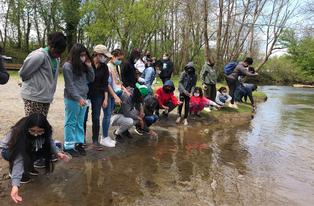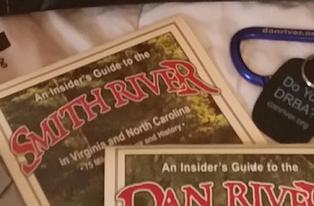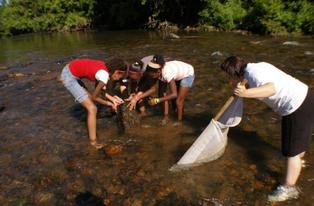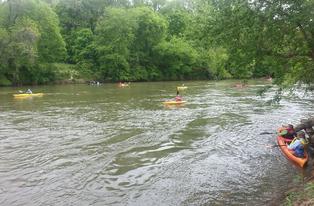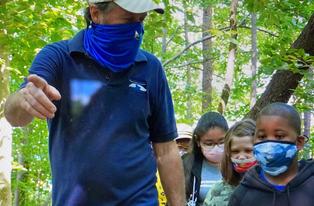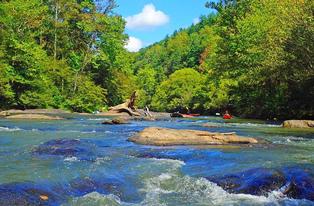January FSO at Matrimony Creek, Eden
January 7, 2023
5:00 AM - 8:00 AM
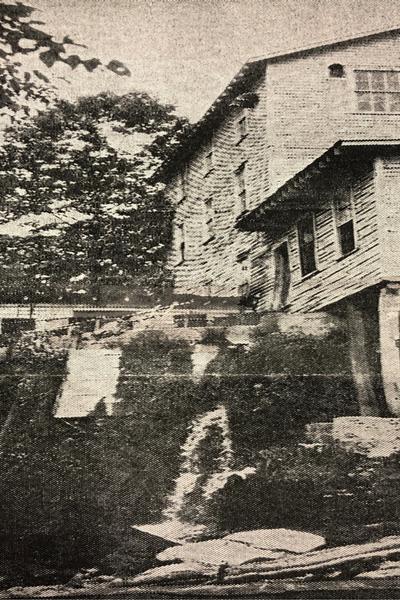
Dan River Basin Association to Kick-Off Year of the Trail with a Hike in Eden January 7, 2023
You’re invited to join the Dan River Basin Association (DRBA) for a First Saturday Outing (FSO) hike on Saturday, January 7, 2023 at the Matrimony Creek Greenway Trail in Eden, NC. DRBA’s FSOs are always free and open to the public. The two-mile hike/walk begins at 10:00 a.m. at 1335 Washington St, Eden, NC 27288.
The year 2023 has been proclaimed “The Year of the Trail” by legislators in North Carolina and DRBA is starting the year with its first FSO of the year at Matrimony Creek Greenway. Events to celebrate The Year of the Trail will be scheduled throughout the state during 2023. DRBA will be hosting and promoting regional events in the Dan River Basin. To find out more about Year of the Trail in North Carolina: https://greattrailsnc.com/. For Rockingham County’s proclamation of Year of Trail visit: https://www.rockinghamcountync.gov/newsview.aspx?nid=6349
Matrimony Creek rises in southern Henry County, Virginia and flows through Rockingham County, joining the Dan River at the western city limits of Eden. The stream is approximately twelve miles long. In 1728, when William Byrd was surveying the boundary line between the colonies of North Carolina and Virginia, he wrote in his diary that Matrimony was “call’d so by an unfortunate married man because it was exceeding noisy and impetuous.”
Waterfalls along the creek provided excellent energy to operate mills. Soon after the region began to be populated by white settlers, water-powered grist mills were erected to grind corn to make bread – then considered the staff of life. Records show that a mill had been erected near the five-foot waterfall, the largest on the creek, at the site Matrimony Mill site by July 1764.
Participants in the hike are asked to meet at 10:00 a.m. at the parking lot of the Matrimony Creek Greenway Trail, 1335 Washington St, Eden, NC 27288 (GPS 36.4839, -79.7857).
Dress in layers, wear hiking shoes or boots, and bring hiking stick(s), lunch, and water.
DRBA’s First Saturday Outings are free and open to the public.
Outing coordinator is Linda Park, an avid fan of the preserve. Please contact Linda Park, 276-806-4442, or lspark@yahoo.com with any questions.
If weather conditions arise, visit www.danriver.org by Friday, January 6, 2023 to determine whether the outing will be held.
The History of Matrimony Creek
In 1782, a tract of 640 acres was granted by the State of North Carolina to James Leak, a brother of Leaksville founder, Captain John Leak. In 1786, James Leak sold a one-hundred-acre tract with the mill site to Reece Price. Between 1786 and 1793, Reece Price built a gristmill on the site. In 1793, he sold the mill to John Gibson and within the next few years, the mill was destroyed by flood or fire. In 1797, the Rockingham County court gave Gibson permission to rebuild the mill.
In 1800, the mill property passed into the hands of Joshua Lindsay, a millwright. Under his ownership, the site included a grist mill, sawmill, and a cotton machine. In 1831, a Leaksville citizen, George Jones, purchased the mill property. Jones died in 1839 and later his heirs sold the property to the Lanes, Moirs, and Roberts, who carried on the mills, cabinet shop, carriage shop, sawmills, and a tan yard. The family of Benton Field was active in these enterprises.
In 1859, Thomas A. Ragland, a native of Halifax, Virginia, purchased the mill property and by 1860 had established an iron foundry near the mill. The foundry produced plows, frying pans, skillets, and other castings. During this period, Daniel and John E. Fields, sons of Benton Fields, carried on the milling business at Matrimony.
In 1862, Jones W. Burton, a Leaksville merchant, purchased one-half interest in the mills and foundry. Two years later he purchased the remaining half interest in the property. Following the Civil War, Burton was forced into bankruptcy. At the sale of Burton’s property in 1868, Thomas A. Ragland purchased the entire enterprise for $300.
In 1869, Ragland sold the mill and foundry to Dan E. Field, but Ragland reserved the use of the foundry for the next four years. At some point Casper Rodenhizer became a partner in the foundry business with Ragland. Casper Rodenhizer died, and his heirs continued the foundry business.
Between 1884 and 1886, the three heirs each sold their interest in the foundry to Zebedee Beale. Beale continued both the milling and foundry business at the Matrimony Mill site. In 1886, Beale advertised in the Dan Valley Echo (Leaksville, NC) that he would continue the foundry operation making all kinds of castings, plows, and hollowware. This is the last known reference to the foundry. A few years later, Beale lost the property when he defaulted on the property mortgage.
In 1895 and 1898, the Matrimony Mill was purchased by Jesse C. and E. B. King. They were the sons of Joseph B. King who had owned a grist and sawmill on the upper reaches of Matrimony Creek, a short distance below the Virginia state line. That mill became known as “King’s Upper Mill” and the Matrimony Mill near Leaksville became known as “King’s Lower Mill.” In 1893, Joseph King sold the upper mill to his brother, D. F. King, a well known Leaksville businessman. The upper mill was no longer in operation after 1940.
Jesse and E. Be King leased their lower mill to various millers, and in 1908, the wood frame dam was replaced by a rock dam. The mill continued to use a water turbine to power the milling enterprise. The King brothers gave their mill a new name in the early 1900s – Liberty Mills.
In 1909, the towns of Leaksville, Spray, and Draper still had no electric service. That year, E.B. King and J. Frank King formed the Leaksville Light and Power Company under the direction of their father, Joseph B. King. The company began service by generating electric power with the Liberty Mill turbine, providing electricity to customers from sundown until 11:00 pm. They began business with 79 customers. As more houses were wired and added to the system, it became necessary to increase the amount of electricity generated. The company purchased a two-cylinder diesel engine. Later they added a large Hamilton Corlis steam engine with a 30-foot flywheel. When still more capacity was needed, they added two large coal burning steam boilers that were erected in front of the Liberty Mill building.
By 1917, the company was no longer able to generate enough power, and they began to purchase electricity from Southern Public Utility Company, a forerunner of Duke Energy. In 1931, the Kings sold their power company to Southern Public Utility Company, and the days of the small power company were over.
Various millers continued the flour, corn, and sawmill business at Liberty Mills. On 7 March 1937, the old King’s mill was destroyed by fire of unknown origin. King’s losses on the building were estimated at $15,000 and Howerton’s loses in the operation were about $1500. Later in that year a new corporation, Leaksville Milling Company, was formed with R. W. Howerton, J. Frank King, and Bessie King as partners. At this time, E. B. King sold his interest in the mill property to the new company. A new mill was rebuilt on the old foundations. The building was similar to the old mill that had burned. The new mill produced flour, corn meal, and animal feed under miller R. W. Howerton. In 1946, Howerton sold the mill to F. H. Jennings, but the following year Howerton re-purchased the business.
In 1956, the Howerton heirs sold the mill to Albert Lee Scott, who had been employed at the mill since the mid- 1940s. Scott continued to run the mill until around 1970 when the stone dam burst. The mill structure with all the milling equipment stood dormant until 15 October 1994 when the building was burned by fire of unknown origins, thus ending two hundred years of milling history at the site.
